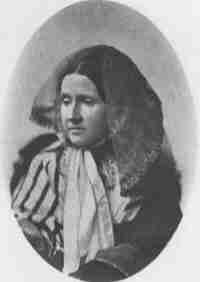 SKC Films Library SKC Films Library |
| SKC Films Library >> Linguistics, Languages, and Literatures >> American Literature >> 19th Century |
 Julia
Ward Howe Julia
Ward Howepoet Julia Ward was born in New York City on May 27, 1819. Her father, Samuel Ward, was a successful Wall Street banker. Her mother, Julia Rush Cutler Ward, a published poet in her own right, died shortly after giving birth to her seventh child, leaving Julia and her siblings in the care of their father. As the daughter of a wealthy family, Julia was exposed to some of the leading thinkers of her time, including Henry Wadsworth Longfellow, Charles Dickens, Charles Sumner, and Margaret Fuller. When their father died in 1839, Julia and her two sisters moved to the home of their brother, Sam, who had recently married Emily Astor, granddaughter of John Jacob Astor. Under her supervision, Julia and her sisters were introduced to New York society. Tragedy struck in 1841, however, when Emily and her newborn son both died. In 1843, Julia married Dr. Samuel Gridley Howe, who was well known for his work on behalf of the Greek Revolution, for his reform work for prisoners, and his efforts in education for the blind. The couple spent most of their married years living at the Perkins Institute for the Blind, in Watertown, Massachusetts, which Howe had founded. The marriage was often a rocky one, with Dr. Howe firmly believing that "a woman's place is in the home" and Julia desiring a much more fulfilling life. There were rumors of infidelity, but little solid proof. And, to complete the less-than-ideal match, Dr. Howe was twenty years older than his wife. Although Dr. Howe forbade Julia from working outside the home, he had no problem allowing her to write for and help edit The Commonwealth, his abolitionist newspaper. Dr. Howe was also unable to prevent her from publishing Passion Flowers, a collection of her poems. Although the work was published anonymously, the poems themselves were so personally descriptive that many who read them knew almost immediately who the author was. The poems "talked about" the intimate affairs of a "real" man and woman, hinted at infidelity, and openly challenged the authority of a husband. One of those who figured out the identity of the author was Dr. Howe, who was devastated by what he perceived to be his wife's disobedience and betrayal. Dr. Howe was a believer in the revolutionary plans of John Brown, and helped fund his ill-fated raid on Harpers Ferry. After Brown was captured, Howe fled to Canada to avoid prosecution as a collaborator. In 1861, after the Civil War started, Julia Howe visited military camps near Washington, D.C. There she was inspired to write The Battle Hymn of the Republic, which was subsequently set to the tune of "John Brown's Body." It was published in the Atlantic Monthly the next spring and quickly became the major war song of the Union forces. As Julia's fame grew, Dr. Howe found it increasingly difficult to keep his wife at home. She became openly involved in a number of causes, especially women's suffrage. In 1868, she, along with Lucy Stone and others, founded the New England Women's Club, which later became the American Woman Suffrage Association. Her interest in world peace led her to found the American Friends of Russian Freedom in 1891, to lead the American section of the Woman's International Peace Association, and to serve as president of the United Friends of America in 1894. In 1907, Julia Ward Howe became the first woman elected to the American Academy of Arts and Letters. She was also the recipient of three honorary doctorates of letters degrees. Her other writings include A Trip to Cuba (1860), Sex and Education (1874), A Memoir of Dr. Samuel G. Howe (1876), Modern Society (1881), Margaret Fuller (1883), From Sunset Ridge; Poems Old and New (1898), Reminiscences (1899), and Sketches of Representative Women of New England (1905). Julia Ward Howe died in Portsmouth, Rhode Island, on October 17, 1910. A selection from Julia Ward Howe's speeches and essays was published by her daughter, Florence Howe Hall, under the title Julia Ward Howe and the Woman Suffrage Movement, in 1913. A selection from Howe's journals was published by another daughter, Laura E. Richards, under the title The Walk with God, in 1919. Laura E. Richards and Maud Howe Elliott published Julia Ward Howe, 1819-1910, in 1915; the daughters won the Pulitzer Prize for this biography. SOURCE SEE ALSO |
| SKC Films Library >> Linguistics,
Languages, and Literatures
>> American
Literature >> 19th Century This page was last updated on 05/27/2017. |